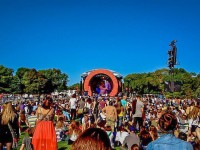
The Global Citizens concert took place at Central Park this past Saturday. Caroline Lebrant/ The Fordham Ram.
By Bailey Hosfelt
I spent my fourth Saturday living in New York City on Central Park’s Great Lawn, surrounded by over 10,000 people as we simultaneously sang lyrics at the top of our lungs and danced for seven consecutive hours.
Looking back at the skyline during the sunset and seeing just how many strangers were behind me experiencing the same day, I practically had to pinch myself to prove that it was my present reality. How did I go from living the mundane day to day in a town nobody has ever heard of to this? How did I get to become a part of this revolutionary event?
The answer to how I got tickets to attend the Global Citizen Festival is fairly simple. After noticing various advertisements for the free ticketed event, I did a quick Google search and learned that anyone could win entrance into the festival after completing a series of action journeys.
Because I signed petitions, made phone calls to my state government, sent emails persuading world leaders to attend and tweeted to raise awareness for the cause, I was entered into a lottery system to win a pair of tickets to the festival on Sept. 26. As soon as I received the email that I was one of the lucky winners, I was overcome with excitement not only to see a handful of my favorite artists perform live, but to learn more about how I, as a global citizen, could bring about change.
With the United Nations General Assembly meeting the same weekend, the festival had a clear political overtone that was at the forefront of the event. Considering the main Global Citizen goal is to eradicate worldwide issues such as extreme poverty, hunger and disease, as well as provide insurance for the education of girls, environmental sustainability and investment in foreign aid by 2030, it was understood that the audience members supported the global goals displayed on the stage.
However, the argument can be made that those in attendance were not truly devout social activists dedicated to the movement, but simply people who saw an opportunity to see Ed Sheeran for free and seized it. I disagree with this claim.
The main objective of the event was to make members of the audience aware of the injustices occurring in the world, thus inspiring them to become global citizens who take action in whatever way they can, as opposed to being a generation of bystanders.
Because this event was free of charge for those who took action, the teenagers and twenty-somethings that accounted for a large percentage of the audience saw that you do not need big bucks to make a difference. The Global Citizens movement is not heavily reliant on an influx of monetary donations from its supporters, but rather reinforcement through personal action and word of mouth.
Young adults in previous generations were likely to parade through the streets passionately vocalizing their opposition to the Vietnam War, holding homemade signs that read “Make Love Not War.” Conversely, the way Millennials show their awareness towards societal problems and injustices is typically through 140 characters on Twitter or photos shared on Instagram.
After letting down the audience with a video message instead of a physical appearance earlier in the concert, Michelle Obama shocked the crowd when she came on stage to speak about her campaign titled “62 Million Girls,” which highlights the large amount of females who are deprived of the basic right of education. The First Lady urged the audience members to post pictures on Instagram with the #62MillionGirls explaining what necessary tools they learned in school. Because Beyonce posted an image to her profile supporting the campaign, her 47 million followers could see the hashtag, click on it to inquire about its significance and learn more about the motion to let all girls learn.
Ultimately, it is the start of a conversation that is extremely important. If 60,000 people attend the festival and only half of that number take away the message to become more conscious of world issues, it will still bring about change.
Malala Yousafzai is one individual who believes that girls deserve an education and has dedicated herself to make a difference despite living in a place where she had no voice. At just 18 years of age, she was able to stand before an enormous audience and give a powerful speech urging for justice, equality and peace throughout the world. The warm ovation given in support for her tireless efforts of activism proved just how impactful a singular person can be.
As Vice President Biden said, “It’s within our reach. We can change the world. We really can. You can.”
Bailey Hosfelt, FCRH ’19, is undecided in her major from Wheeeling, West Virginia.
